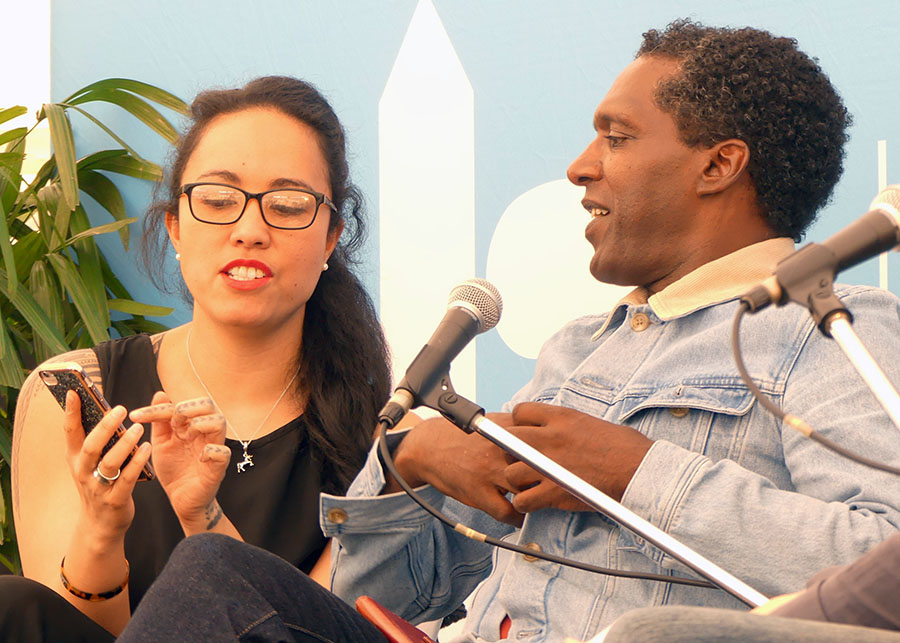Gold from the stone: on poetry and life

Two incredible poets sat together this morning: Courtney Cina Meredith, author of Brown Girls in Bright Red Lipstick and Tail of the Taniwah, and Lemn Sissay, currently Chancellor of the University of Manchester and a Doctorate four times over.
Session chair Zacharey Jane described their poetry as active and dynamic and from ‘dark places for both’.
Meredith, growing up in New Zealand with Samoan heritage, said that from the youngest age she was aware that to ‘live in a world of ideas… I was going to have to work ten times harder’ than anybody else.
In 2011, she became the first Pacific Islander and youngest artist to ever be invited to Germany as a writer-in-residence for the Bleitreu Berlin.
So here she was, at 25, performing for the German president. She was even interviewed by the BBC and listened to by 44 million people worldwide.
Now she was famous internationally, but when she returned home, she found the publishing industry was only interested in fitting her into a proscribed box.
It has ‘never been a smooth path,’ she recalled, but it has shaped her creativity belonging to a community that struggles ‘to be seen, to be heard’.
But by March 2017, she finally broke free of what she saw as the publishing industry’s corporatism and now freelances, enjoying every minute of it.
Sissay has a similar feeling. He was stolen from his Ethiopian mother and fostered under the name ‘Norman’ till the age of twelve.
Then, his very Christian foster parents, having never parented a child through adolescence, decided to return him to the system.
Sissay said they believed ‘it was the Devil inside him’.
He then went through four different children’s homes in six years until he was 18, and Sissay realised he had ‘no-one to prove my story… no proof that I existed.’
He suddenly understood what family was: ‘it was like breathing… you realise it’s important only when your drowning.’
Poetry thus became the way he interpreted the world. At 21, Sissay was reunited with his mother and now has ‘a dysfunctional family like everyone else.’
He discovered his true name meant ‘why’, which reinforced his belief that he ‘was born to be what I am’, a poet, for they are meant to rise up in times of crisis.
Meredith pointed out, however, that ‘you don’t want to fill the gaps, don’t want to spend time circling wounds.’
Sissay agreed, affirming that he is ‘not defined by [his] scars, but [his] ability to heal’.
In response to an audience question on how did he learn to love in the face of such adversity, Sissay said that ‘we become bridge-builders rather than show you the ravines between us’.
For Meredith, she now marvels at having the ‘luxury of time to write’, because at the forefront of her mind is the women who came before her, who worked so hard and put others’ needs before theirs.
Poetry has changed her world and this is something she wishes to share. When working with young people she tells them ‘let’s be free together, let’s have a space and trust that it will never leave us’.
She has planted herself in this ‘space’ and will hold it open for other women as long as possible, because she is ‘the rock, no longer the stream accommodating the landscape’.
As Jane said, ‘when you write a poem you change the world a little bit’, and this could be seen so strongly in the works of Meredith and Sissay.
Drawn from adversity and love, their words give life to experience and they share it with all those who are open to listen.
Jade Hurley is a Southern Cross University Creative Writing BA student.
